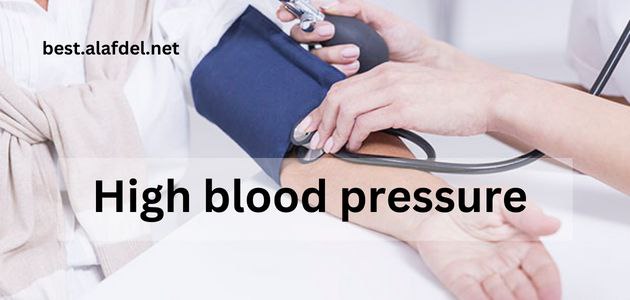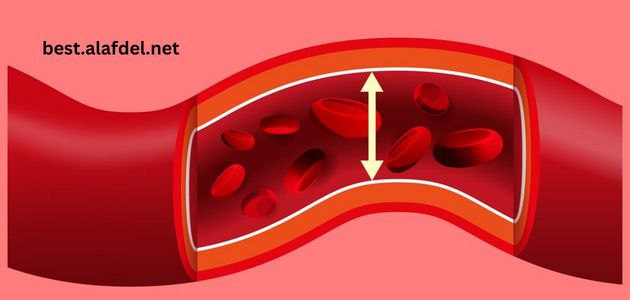High Blood Pressure; its Symptoms and causes
High Blood Pressure
High Blood Pressure; What are the main causes of the disease? Learn about the most important ways to help you manage its symptoms during pregnancy.

High Blood Pressure; known as [hypertension] occurs when the pressure of the blood against the walls of the blood vessels is consistently too high. This elevated pressure can harm blood vessels, the heart, and other organs, resulting in major health issues such as heart disease, stroke, and kidney failure. High blood pressure is known as the “silent killer” since it normally has no symptoms and can go untreated for years.
The main causes of high blood pressure
The specific reasons for “high” blood pressure (hypertension) are not always clear, but various factors have been related to its development. The following are some of the most common reasons for high blood pressure:
- Genetics: High blood pressure can run in families, and certain gene variations may make a person more susceptible to developing the condition.
- Weight: Being overweight or obese can increase the risk of high blood pressure.
- Diet: A high-salt, high-saturated-fat diet can contribute to high blood pressure.
- Age: As a person becomes older, the chance of developing high blood pressure rises.
- Physical inactivity: People who are insufficiently physically active are more likely to acquire “high” blood pressure.
- Stress: Chronic stress might temporarily raise blood pressure.
- Smoking and alcohol consumption: Both can raise blood pressure.
- Chronic kidney disease, sleep apnea, and other underlying medical conditions.
“Also read best 10 foods for diabetics“
high blood pressure symptoms

In many cases, “high” blood pressure (hypertension) doesn’t cause noticeable symptoms and is referred to as a “silent killer”. This is why it is important to have regular blood pressure checkups. However, when high blood pressure symptoms occur, they may include:
Headaches
Persistent or severe headaches can be a sign of “high” blood pressure.
Blurred vision
“high” blood pressure can cause blood vessels in the eyes to burst or bleed, leading to temporary vision changes.
Dizziness or lightheadedness
These symptoms can occur as a result of a decrease in blood flow to the brain.
Nosebleeds
High blood pressure can cause the blood vessels in the nose to rupture more easily.
Shortness of breath
When the heart has to pump harder to move blood through the narrowed blood vessels, a person may experience shortness of breath.
Chest pain
Angina or chest pain can occur if the blood flow to the heart is restricted.
Blood in the urine
“high” blood pressure can damage the tiny blood vessels in the kidneys, leading to blood in the urine.
“Also, read diabetes prevention methods “
high blood pressure during pregnancy

High blood pressure during pregnancy, also known as gestational hypertension, is a condition in which a woman’s blood pressure increases during pregnancy. It can lead to serious complications for both the mother and the baby if not properly managed.
Common causes include:
- obesity.
- older maternal age.
- a history of “high” blood pressure.
Treatment may include monitoring the blood pressure, managing any underlying conditions, and in some cases, medication to control blood pressure. So Close monitoring by a healthcare provider is important to ensure the health of both the mother and the baby.
“Also, read the psychiatrist “
high blood pressure diet

A high blood pressure diet that is rich in fruits, vegetables, whole grains, and lean protein, and low in sodium, saturated fat, and added sugar is considered to be the best diet for reducing “high” blood pressure.
This type of diet is often referred to as the DASH (Dietary Approaches to Stop Hypertension) diet. Studies have shown that following the DASH diet can lower blood pressure by up to 14 mm Hg, which is comparable to the effect of some blood pressure medications.
- Limiting sodium intake to less than 2,300 milligrams per day.
- Eating more potassium-rich foods, such as bananas, sweet potatoes, and spinach
- Limiting alcohol intake
- Limiting the intake of processed and packaged foods which are often high in sodium.
“Also read Diabetic care 2023 “
High blood pressure prevention strategies in the health
Several strategies can be implemented to prevent “high” blood pressure, including:
- Maintain a healthy diet: eating high blood pressure diet rich in fruits, vegetables, whole grains, and lean proteins, low in sodium, saturated fats, and added sugar can help prevent “high” blood pressure.
- Exercise Regularly: Regular physical activity can help lower blood pressure and maintain a healthy weight. The American Heart Association recommends at least 150 minutes of moderate-intensity aerobic activity or 75 minutes of vigorous activity per week.
- Maintain a healthy weight: being overweight or obese can increase the risk of “high” blood pressure. Losing weight and maintaining a healthy weight through diet and exercise can help prevent “high” blood pressure.
- Prevent alcohol intake: consuming too much alcohol can increase blood pressure.
- Stress management: chronic stress can contribute to “high” blood pressure. Finding healthy ways to manage stress, such as exercising, yoga, or meditation, can help prevent “high” blood pressure.
- Quit smoking: Smoking is a major risk factor for high blood pressure. Quitting smoking can significantly reduce the risk of developing hypertension and other related health problems.
- Blood pressure monitoring: regularly monitoring blood pressure and tracking any changes is important for the Prevention of hypertension.
After identifying high blood pressure symptoms, cases of high blood pressure during pregnancy, and the preferred diet for hypertension, people may have a genetic predisposition to hypertension or other underlying health conditions that can contribute to the development of hypertension. In these cases, taking medication to control blood pressure may be necessary. It is always best to consult a healthcare professional to determine the best way to prevent high blood pressure.

Comments are closed.